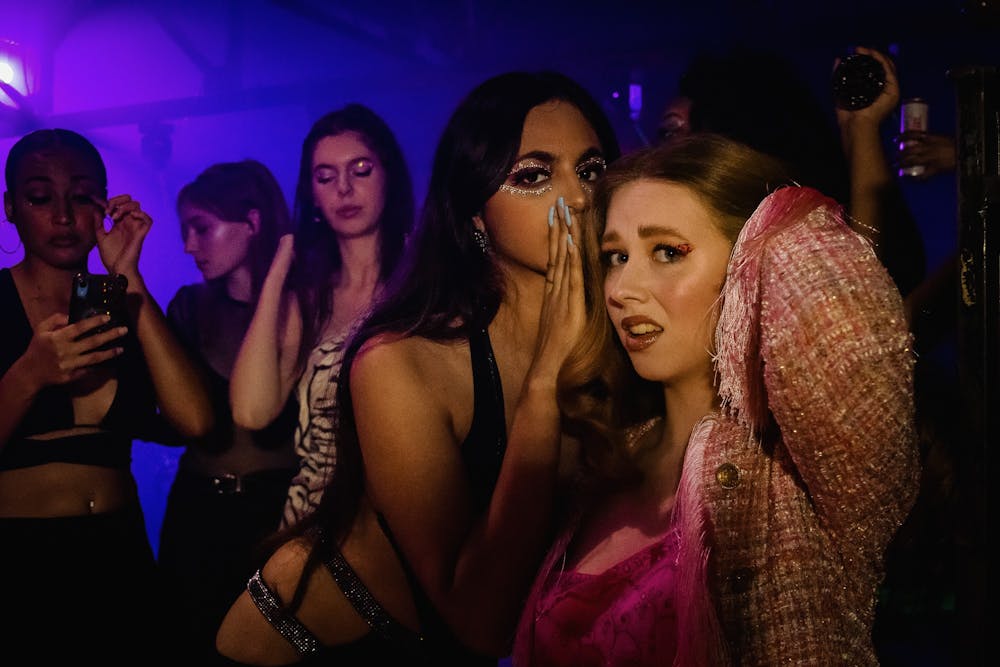Styling, makeup and creative direction by Parker Blackburn
What is youth? Is it a universal experience that everyone reminisces on when they're older? It's always been said that high school and college are the best days of our lives, that you should cherish these moments forever. In the TV shows and movies you watched growing up, it mainly centers around white, middle-class families with loving parents and an overall good home life. Lots of popular high school media follow the same premise of dating, friendship dynamics and how to handle the surface-level idea of high school drama. Described and retold as a time of innocence, where you can mess up and get away with it, to look back and laugh at. But is that realistic? What if the same things they encourage are the same things you're judged for in real life? Is the framework of these shows modeled after what it’s actually like for students, especially Gen-Z, growing up in an ever-changing world? The HBO hit series Euphoria is redefining what youth can look like for all. Shining light on how life’s dirty secrets affect our everyday. And how they do it is quite astonishing.
Euphoria takes on a different approach to covering difficult issues compared to standard teen dramas. The show chooses to center the person and who they are, not the issue. The series tackles various serious matters like substance abuse and unhealthy/abusive relationships by immersing the viewer into the world of the character. The power of storytelling, cinematography and character development helps the audience gain perspective into the reality of what it’s like to be young as well as seeing the truth about how past experiences can shape us into the people we are. Euphoria’s debut season broke barriers with the variety of topics that were handled well, entertaining and engaging, as well as aesthetically pleasing with its unique cinematic style. Even though the 2nd season wasn’t as powerful as the first, it’s still important to talk about what made the show so compelling in the first place.
Euphoria Breakdown
If you’ve been living under a rock and don’t know what Euphoria’s about, it basically follows the perspective of main character, Rue Bennett, as she narrates her journey through drug addiction and relationship dynamics. Rue not only talks to the audience directly but also puts the viewer into own her head, showing you what she feels through rotating rooms, use of color to heighten emotions, and strategic camera angling and movement. The combination of these calculated mechanics allows the viewer to understand and subconsciously share that feeling with the character. You're not just watching a TV show, you become part of its unfolding.
The tone of season two follows a much darker and serious theme compared to the series’ pilot season. In season one, Rue’s objective episodically brought you into the lives of each character. The memoir-like introductions connected their past to the present, providing a glimpse into their life, childhood, and defining moments that continually shape them into who they are. You see them make questionable, risky and borderline problematic decisions that society would normally cast judgment on. The unique storytelling allows the viewer to see these characters as young high schoolers who make dumb decisions, not excusing their actions, but rather providing an understanding of how they navigate situations.
Not only does the show’s structure provide insight into the characters, but the cinematography of Euphoria also elevates this inviting storytelling. Along with the tone, you may notice that the first and second seasons follow completely different color patterns. The overall theme of the first season was living in and enjoying the present moment, the here and now. The show became known by its eccentric and vibrant visuals, bringing pride to bisexuals everywhere. The creators did not do this simply because it fits the vibe; it was carefully orchestrated to accentuate the overall experience. The color blue represents the feeling of melancholy and calmness, yet it is rarely used alone. Typically, it’s seen with the colors pink (drawing attention to their youth, innocence and playfulness) and purple (representing the euphoric high being the “color of fantasy and illusion”). Rue’s “Two Seconds of Nothing” scene is a perfect example of how color is translated into Rue’s roller-coaster of emotions.
In comparison, season two pivots the theme, as well as the cinematography from the phantasm of season one to season two’s bitter consequences. The visuals feel much more nostalgic using muted yet saturated tones focusing on yellow, green and red. Yellow is both symbolic of wisdom and knowledge, as well as insecurity and naivety. This duality can be seen throughout the show as characters are trying to navigate difficult situations, looking for the right answer. The use of green elevates the immaturity of the characters while also displaying their nature of youth, and red is typically used to build intensity and passion to scenes, either predicting or heightening aggressive change to the plot. The color palette also imitates the classic traffic light conveying the fluctuating pace of season two. The show also uses moving camera angles and close personal shots to act as a guide, showing us the scene’s focal points, bringing you into this environment as if you're there.
Euphoria also has a fluid cinematography style that often follows the main focus of the scene, whether that be dialogue, tone, or emphasizing a particular moment or memory. It guides the audience between focal points without sacrificing plot continuity. The infamous single-shot carnival scene in season one flows from one character to another, hinting at the chaos that will arise in each character by the end of the episode. Along with foreshadowing, it also feels like the viewer is at the carnival, catching a glimpse of their current state, leaving us in wonder how their story will continue.
Apart from the camera work, Levinson uses the set as well to further emphasize the mental state of the characters. Most notably, the rotating room scene in the pilot episode was a physical manifestation of Rue’s mental state. As Rue is stumbling around the revolving hallway, the other partygoers proceed as if nothing is happening. Because ‘nothing’ is. They stride around upside down as Rue is trying to grasp the disparities between her situation and everything around her. You are not only a witness to Rue’s physical experience but mental experience as well.
By visually immersing the viewer into the storyline, it establishes this pseudo-personal connection between you and the characters. Just for a second, you are able to feel what it’s like in their shoes.
--
To address the controversy on whether the show is glamorizing drug use, hyper-sexualization of teenagers, and many more accusations, the show is doing the complete opposite of this for the majority of the claims. If it wasn’t clear in the first season, it is made especially transparent in episodes five and six of season two, where Rue is in a desperate battle against herself and the world around her. The party scenes, montages of drug highs, and inclusion of sex (in most cases) are short-lived experiences meant to, as previously stated, bring the audience into what the characters are feeling in the moment. The rest of the show is highlighting the problems within these characters' choices by showing the conflict between characters and removing aesthetics from serious scenes like underage sex with adults and scenes with abuse.
It's also debated whether the plot of Euphoria is realistic. It isn’t. The series is still a TV show with its primary purpose being entertainment, notably in the second season. The realistic aspect of the show is the characters, what they went through as kids, as well as their present. The characters are able to create a shared experience with people all around the world and of differing ages. Yes, even high schoolers. Believe it or not, it makes sense for the show to center around teenagers in high school because for most, it’s the first time where you start to make your own decisions and question who you are in this world. A lot of firsts happen in high school, and as you and the characters were navigating these new situations, you, they, acted out on your emotions, didn’t know how to regulate them, and made decisions that are cringe-worthy to this day. Everybody knew a boy-crazy girl like Cassie, a mean girl like Maddy who actually has a good heart but hard life, a star-athlete like McKay who didn’t make it big after graduation, the list goes on.
Not everyone encounters a Nate with psychopathic tendencies or knows someone with substance abuse issues, but these people do exist and they’re not that rare.
Reality.
It’s crazy to think everyone hasn’t seen Euphoria, and some don’t like it due to its intense onscreen performances, unrealistic plot devices and excessive nudity (understandably), but if you look past the entertainment aspect, a lot of what the characters feel and experience are shared among the crowd, and even here at UofSC.
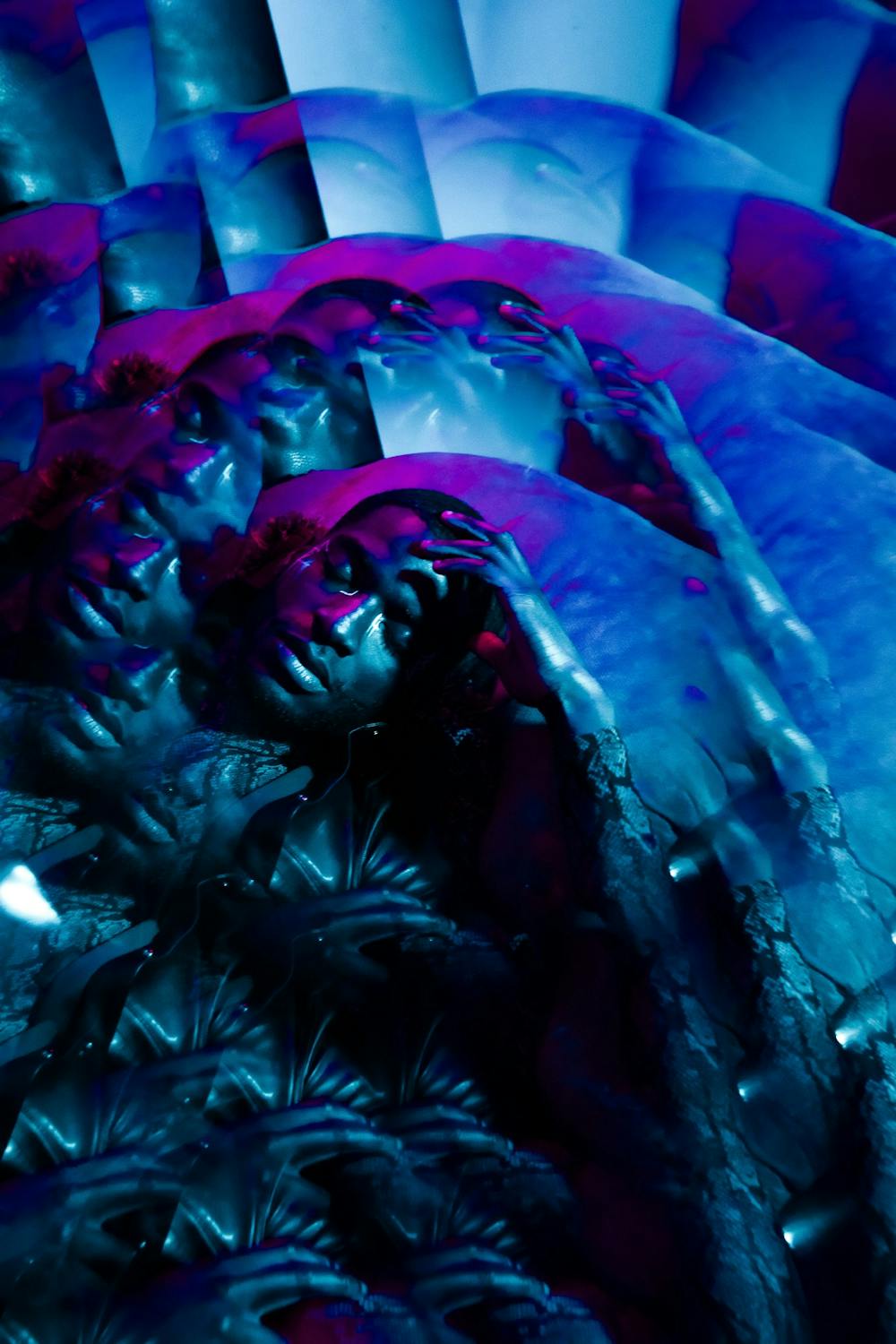
Devin
When talking to senior Devin Williams, youth looks like a trial-and-error process, where nothing has to be perfect because you’re just learning as you go. But Devin didn’t get to live up to his own ideal of youth until he got to college. In a Southern Baptist black home, Devin wasn’t allowed to party, make his own mistakes or get out much due to the strict conditions he grew up with. He felt restricted. Not to mention his mom was in the military as well. The Williams family is full of love but there’s not a clear avenue to translate that love; there’s a distance between them, silence weighted with the things they don’t talk about. A quiet home led to a quiet son. Devin was shy and introverted for the majority of his youth, having a couple of close friends, but mainly keeping to himself. Being held on a “tight leash” his entire K-12 career, constantly having to check in with his parents made him not want to go out at all. But that all changed his freshman year of college.
Devin got his first taste of freedom. No check-ins, no restrictions, just free to make his own decisions, make mistakes, go after his dreams and finally, have some fun. When he first came to college, it was like seeing the sun after being holed up for years, but he still had to squint when he was finally outside. Devin had to adjust to this new beginning. He was still pretty introverted his freshman year, not partying much, just learning how to navigate this huge new world by himself. Even though he was new to the scene, he still challenged himself to take advantage of this newfound freedom. Devin was named the second runner up for Mister Freshman at Savannah State, then later appointed to the executive press secretary for student body president. But when he transferred to USC, he challenged himself even more. He pledged for Kappa Alpha Psi and his brothers have been the biggest impact on him. Even when Devin was pushing himself to try new things, his brothers saw even more potential in him than he saw in himself. Noticing his professionalism, his brothers challenged him to join the National Pan-Hellenic Council (NPHC), the coordinating council of the Divine 9, the nine historically African American fraternities and sororities. He’s the president, by the way.
Devin’s experience of youth is full of confusion and excitement but that’s what makes youth so special… you never know what will happen next, but at least you’re here for the ride.
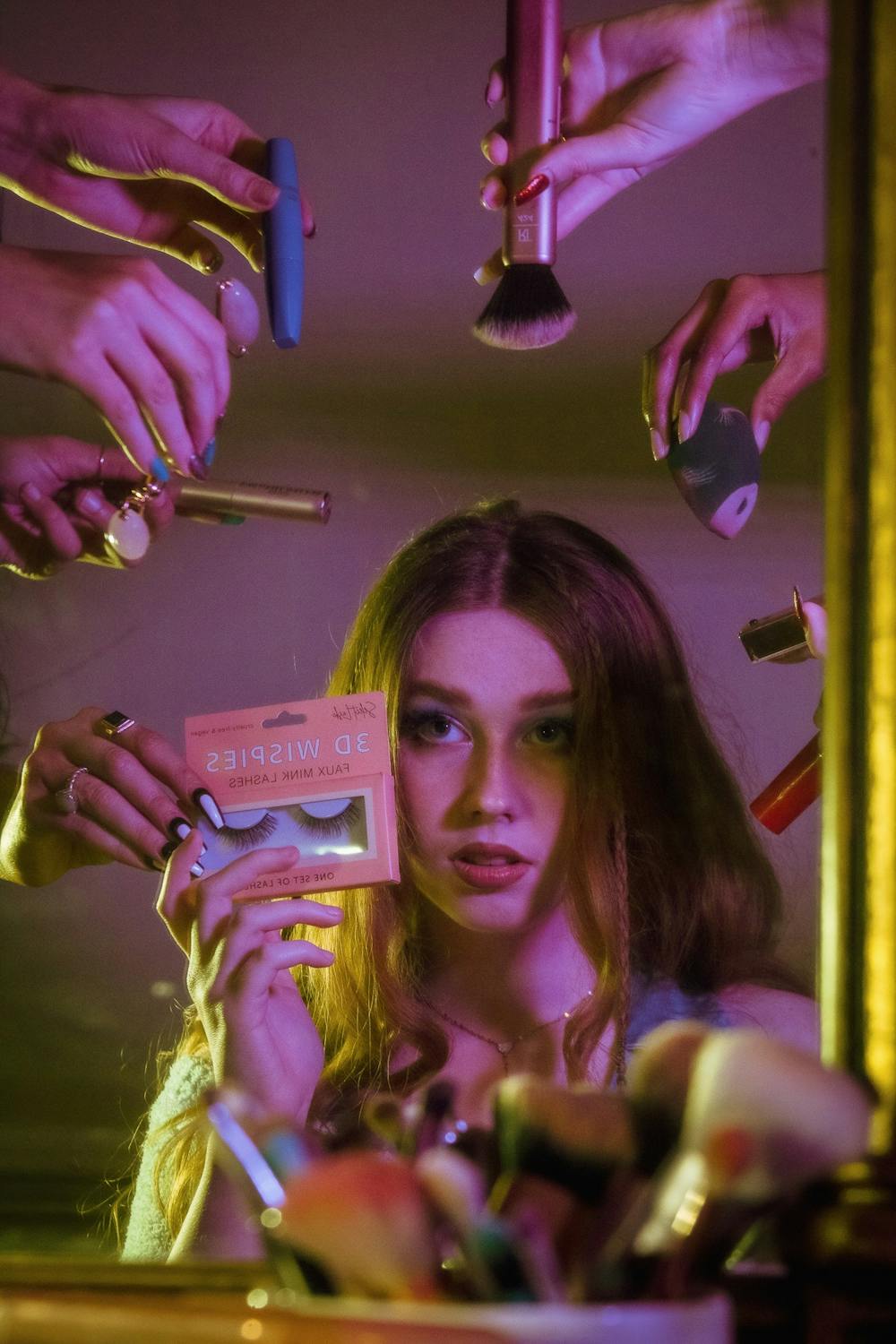
Lauren
Freshman Lauren Wagner believes youth is full of growing pains. Loss has been a consistent theme throughout Lauren’s life so far. From losing her beloved Uncle Jerry out of the blue, sister-in-law’s dad to suicide, grandpa to Alzheimer’s, and grandma to depression shortly after the death of her husband. Of course, the consistent passing of loved ones is hard to cope with, but for Lauren, her time of mourning comes on a blue moon. Perhaps because she has dealt with so much grief, it’s difficult to cry, but sometimes… sometimes when she thinks about a past family member it just “punches [her] in the gut.” But this is life. Life is full of sadness, loss and grief, no matter how uncomfortable and sad it is, there’s no denying its presence. But Lauren keeps going. In her words, “what matters most is the time you spent together.”
Dealing with loss at a young age can lead people to feel unmotivated to carry on, let the grief takeover, and in Rue’s case, use drugs to ignore the pain. But Lauren chose to be different. Lauren chose to take her pain and transform it into something she helps others with. Volunteering and community service have always been a part of her whether it be through the Girl Scouts, Beta Club or National Honors Society. She was able to do over 700 hours of service through wildlife conservations, child protective services, nursing homes and orphanages. Currently, she is contemplating majoring in Neuropsychology because she has seen firsthand how much the brain and mental health can affect you.
Lauren sees the good where there seemingly is none, helps the helpless when no one else will, and takes her darkness and still illuminates light. She’s a natural-born leader. Lauren wants to live life as it is. She wants adventure, love, heartache, everything. Because if she were to die tomorrow, she wants to know that she lived. Lauren’s youth, is truly, just her beginning.
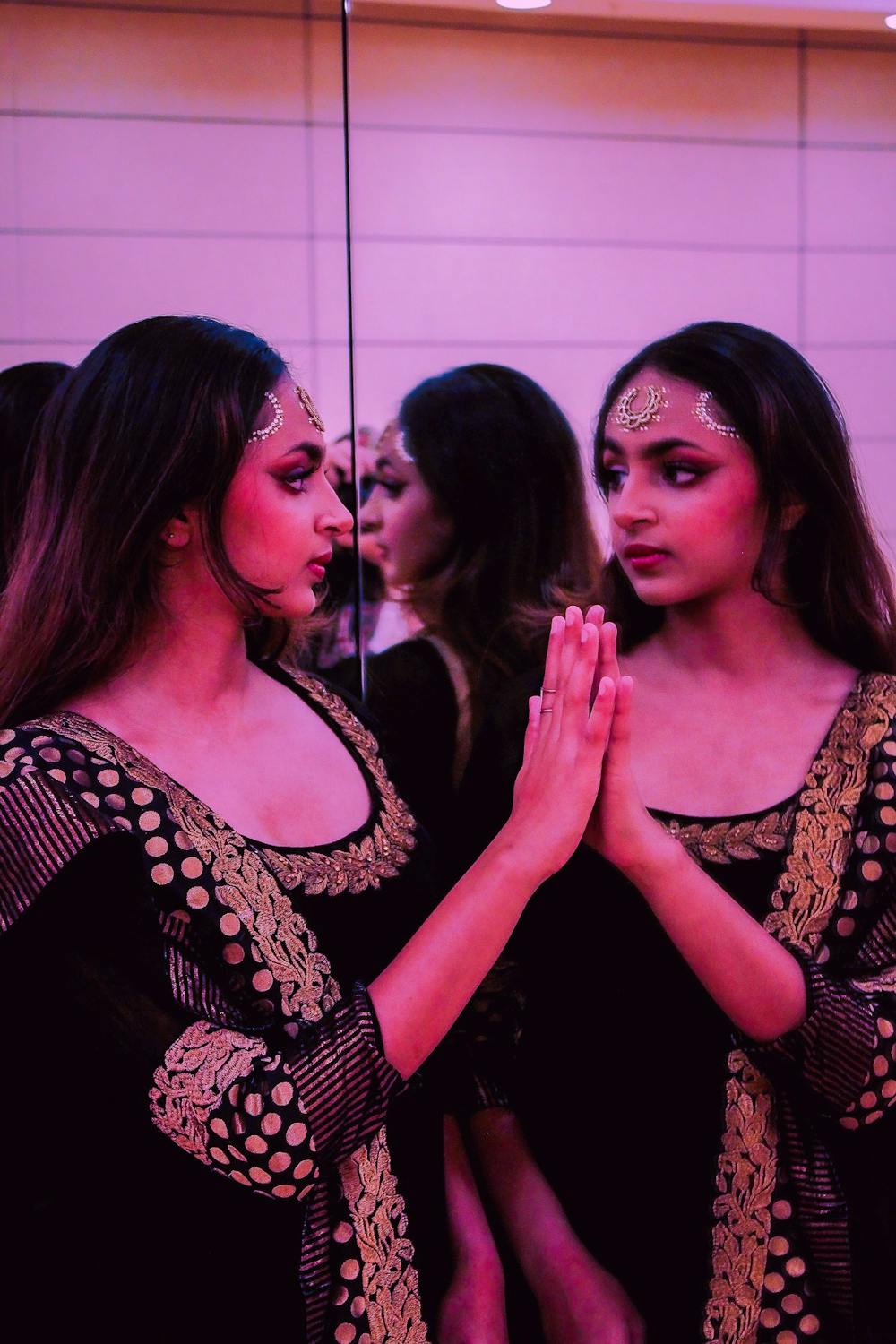
Tia
Tanishq “Tia” Simon has gotten to live through two ideas of youth. Growing up in India was a gift to Tia. The people and culture filled her younger years with color, and she particularly admired the unique history of her home country. While her Indian pride is strong, at times she felt held back by the strict lifestyle she was raised in. Whether it was the conservative school uniforms, the limited freedom or the expectation to get married before 25, Tia knew she wanted to be free of limitations, no matter how much she loves her country.
Moving to America was a dream come true for Tia because she gets to experience what it’s like to be free. Tia has also loved American culture for as long as she can remember. Watching Mean Girls on repeat made her feel like she could live the American dream. Everyone's watched a movie or TV show where they want to embody a character’s entire persona (aka Maddy Perez), but it’s different for people of color. The people, the parties and the overall freedom to do and wear whatever she wants comes at a price. At some level, a person of color has to shed a layer of their identity to fit into these ideal, white narratives. Tia had to realize that she can’t idealize being American because it takes away from her cultural pride and identity. Now, she’s learned to balance appreciation with respect for herself as well.
Overall, Tia’s youth has been “an interesting journey.” Though America is nowhere near perfect, Tia was able to find her missing pieces of life here while staying true to her home.

Xavier
To Xavier Sapp, youth is the future. We are the future. What we do now is what shapes the rest of our lives, and determines the world’s destiny as a collective. Youth is an ever-changing time in everyone’s life. He looks at the big picture, sees what previous generations have lacked in the past and believes that Gen-Z, as a generation, can be better. Xavier believes they're more self-aware, open and accepting of identities that have been previously voiceless in the past.
During high school, his family was picture perfect and expected him to be the same. They were hard on him; pressured him to do good in school, go to church every Sunday and be a goody-two-shoes. It was tough love, but it was still love. Being black requires you to work harder than everyone else just to make it in this world, not excel, just be in the same room. Xavier’s parents knew that and raised their son to be great. It’s a tough life to live at such a young age but he’s thankful for it now. But now, it's time for him to lead the life he wants to live.
Growing up, Xavier was an audience member. But he was ready to hop on stage. He saw everyone around him seemingly easily getting all the things he wanted while he had to work ten times harder to achieve. He kept his head in the books and made sure to stay on track, but his counterparts got more recognition, awards and appreciation for making the school look good. Though he was able to graduate high school early, constantly staying focused on his work left him contemplating who he was beyond school. By no means, in our early 20s are we supposed to know who we are, but it is a hard journey that everyone goes through at some point. Now that’s he’s older, he wants to change for himself. Xavier doesn’t know who he is yet, but he can’t watch everyone else succeed and go after their dreams while life just passes him by. He deserves his applause too and he’s willing to work for it, even if it means finding himself first.
Coming to college, he was still headstrong in his studies but as he transferred to USC-Columbia, he knew that he needed to start living for himself. And now he is, the Euphoria project is one of his first times stepping out of the box and continues to challenge himself to do more.
Xavier believes youth is about change and recognizes that he himself has to change if he wants to be something… someone in this world. And it looks as though he’s doing a pretty good job at it.
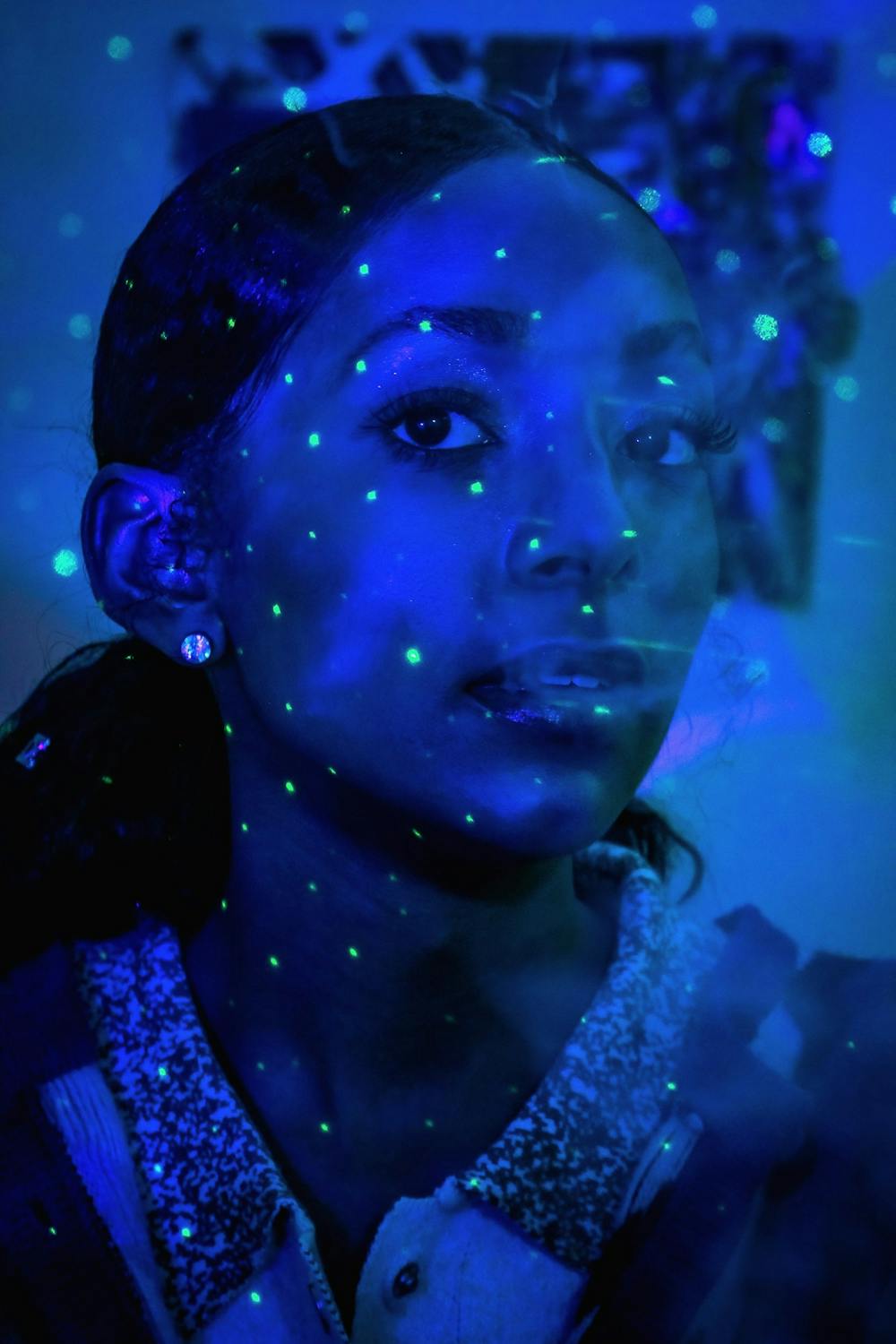
Mikenzie
Mikenzie Turner’s youth in high school was all about having fun and finding herself. But it was also a time when she lost herself. Try to fit in. Be like everyone else. ‘Live life to the fullest.’ At the time, that looked like drinking, smoking, and doing whatever she wanted, no matter the consequence. Going to a predominantly white private school that only had about a 64:8 ratio of non-black to black students is tough. At first, she wasn’t categorized as the ‘pretty girl’ so she had to make up for it in her personality. When she finally had her ‘glow-up,’ everyone noticed her. She was an athlete, got good grades and now was approved by her classmates. She didn’t want to lose that, so she started doing what everyone was doing. Looking back now, she wishes she didn’t corrupt herself and change from the caring person she was to what she describes as...a bitch.
Around 11th grade, it all hit the fan. Her parents found out about everything. From the alcohol to drugs to her most intimate moments. At the time, her relationship with her parents wasn’t the best, but she didn’t realize the impact of her decisions until her mom was crying for a week straight, learning about how truly Mikenzie felt. It was a dark time. She fell into a depression where she even contemplated letting herself go. But luckily her sister came in, and she realized how many people love her still despite everything she’s done. She found herself again. She stopped conforming to society because it wasn’t her. She wasn’t living a life she wanted but a life she felt she needed to keep. By taking steps to better herself, her relationships and remember who she was when she was younger, so happy and free, now, her parents, siblings and newfound friendships are stronger than ever.
Mikenzie has had her ups and downs throughout her life so far but once she faced her reality, she made the decision to change it for the better. No matter our past, we can always learn, heal and improve from it. Mikenzie’s done it, and she’s happier than she’s ever been.
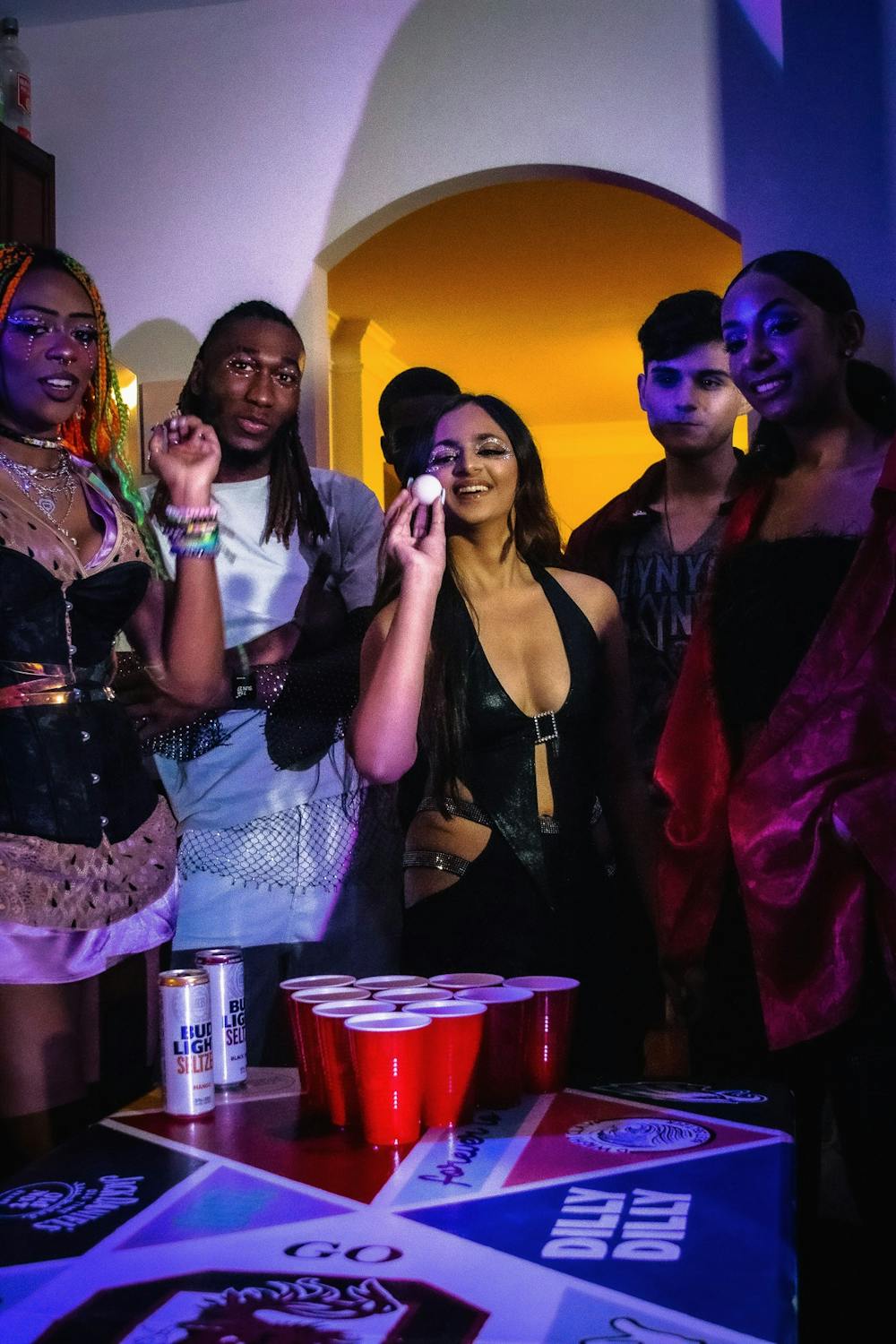
Everyone’s life is different. These are some of the most formative times of our lives and Euphoria is helping people realize that it’s okay to make mistakes. Because you're young, stupid, irrational, and scared. Scared because we don’t know what the rest of our lives look like. By bringing us into the head of Rue, Jules, the entire cast, and even Nate, we see their story. As much as you hate their decisions, it’s hard to hate them because you not only see their shortcomings, you see the entire field. Why they are who they are. Euphoria shows you, you. All the glitter, gold and garbage it comes with.
There is no ideal of youth you should look up to. Your life is your life, and you shouldn’t feel ashamed that you didn’t go out every weekend, didn’t party, or didn’t have your first kiss. Or if you did do those things, then you can look back and reminiscence on good times before you knew what was coming. Now you can learn from the past and move on. Your mistakes don't define you, nor your trauma, nor the time you didn’t live. What you choose to do with these experiences is what truly matters. And right now, you're still young, you still have an entire life to live. So stop dwelling on the past, and start living for you. You deserve it.
